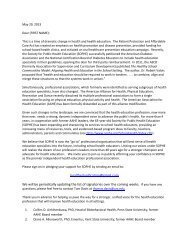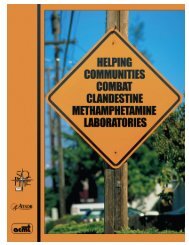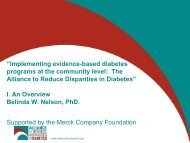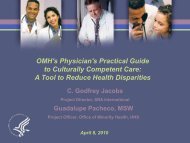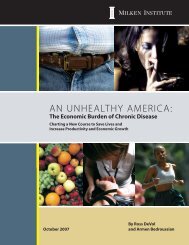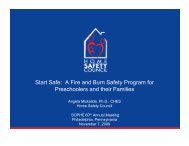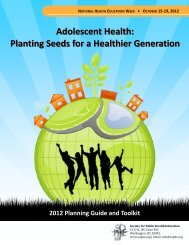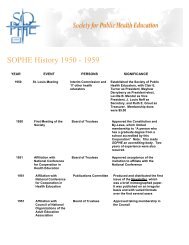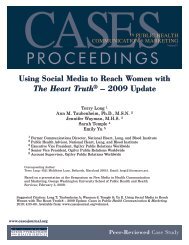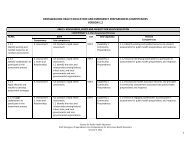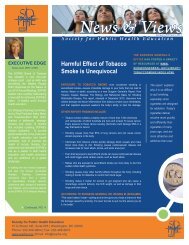healthy people 2020 - Society for Public Health Education
healthy people 2020 - Society for Public Health Education
healthy people 2020 - Society for Public Health Education
You also want an ePaper? Increase the reach of your titles
YUMPU automatically turns print PDFs into web optimized ePapers that Google loves.
friday | november 5 & saturday | november 6<br />
✯ Conference Abstracts ✯<br />
In 2008, the leadership was appointed of the <strong>Health</strong>y Secretary’s Advisory<br />
Committee on National <strong>Health</strong> Promotion and Disease Prevention<br />
Objectives <strong>for</strong> <strong>2020</strong>. For more than 24 months, the committee has<br />
worked through meetings, comment periods, and public <strong>for</strong>ums around<br />
the country to gather input on the vision, mission, goals, focus areas, and<br />
criteria <strong>for</strong> selecting and prioritizing objectives. The <strong>Health</strong>y People <strong>2020</strong><br />
objectives are due to be released by the end of the year, leveraging scientific<br />
insights and lessons learned from the past decade, along with new<br />
knowledge of current data, trends, and innovations. <strong>Health</strong>y People <strong>2020</strong><br />
will reflect assessments of major risks to health and wellness, changing<br />
public health priorities, and emerging issues related to our nation’s health<br />
preparedness and prevention. This panel presentation will provide an<br />
update on the process used in developing the HP <strong>2020</strong> framework as well<br />
as relevant areas where health education and health promotion can have<br />
the greatest impact at the national, state, and local levels.<br />
saturday, november 6<br />
early risers 1<br />
sat / nov 6 / 7: 00 am - 8:15 am / Room: Matchless<br />
holistic approach to health: the mind<br />
body connection<br />
Be<strong>for</strong>e, I Didn’t Dream: A Promotor Based Mental<br />
<strong>Health</strong> Intervention.<br />
Pamela Gudino, MPH, Program Director, Somos Mayfair<br />
Improved maternal mental health can result in improvements in school<br />
success and emotional well-wellbeing <strong>for</strong> children, with lifelong benefits <strong>for</strong><br />
our community. In east San Jose, Cali<strong>for</strong>nia there are extremely few mental<br />
health resources <strong>for</strong> undocumented immigrant Latina women and few bilingual<br />
and bicultural therapists. In the absence of funding and political will to<br />
provide health resources <strong>for</strong> this population, promotores (community health<br />
workers) working with a non-profit organization, Somos Mayfair, piloted a<br />
model <strong>for</strong> immigrant mothers to provide group support.<br />
theoretical model: Somos Mayfair promotores incorporate Freirian<br />
principles of popular education into our leadership development and our<br />
education spaces: In our leadership development, we believe that lasting<br />
change requires understanding power and systems of oppression, including<br />
our own biases, we emphasize the importance of learning by doing and<br />
believe that leadership is rooted in “praxis” or cycles of action and reflection.<br />
In our educational work, “teachers” are facilitators or guides, rather than<br />
authorities; learning is participatory and dialogue-based, we honor and build<br />
on the existing knowledge and experience of the <strong>people</strong> we work with.<br />
objectives: We designed an intervention to increase mother’s selfesteem<br />
and self-efficacy and sense of belonging. We also addressed<br />
mother’s positive attachment behavior. A major objective of the support<br />
groups was to empower participants to lead support groups, or talking<br />
circles, on their own once the 12 week sessions ended.<br />
interventions: Somos Mayfair promotores piloted two 12 week support<br />
groups with 20 low income immigrant Latina women to provide<br />
educational and psychosocial support to mothers reporting feelings of<br />
isolation, depression or difficulty communicating with or parenting their<br />
children. Two of the original participants were recruited to conduct<br />
an ongoing open-ended support group <strong>for</strong> the community. Evaluation<br />
measures/results We collected both quantitative and qualitative data to<br />
assess the groups’ impact. Qualitative data included letters written by<br />
support group participants and interviews with participants recruited to<br />
facilitate the open-ended support group. Quantitative data were collected<br />
using pre and post surveys to measure changes in self-esteem, efficacy,<br />
knowledge, sense of belonging, and positive attachment behaviors. 100%<br />
of the women who completed the surveys reported improvements in all<br />
areas. Analysis of the qualitative data indicates the outcomes are a result<br />
of being valued, <strong>for</strong>ming relationships, and the women learning to see<br />
themselves as agents of change. The results of this pilot program suggest<br />
a model <strong>for</strong> how communities confronting ever diminishing outside<br />
funding can continue to combat health disparities.<br />
The <strong>Health</strong>-Related Quality of Life Curriculum<br />
Development Project.<br />
Cecily Luncheon, MD, DrPH, MPH, ORISE Fellow, Division of Adult<br />
and Community <strong>Health</strong>/NCCDPHP/CDC; Stephen James, MPH, CPH,<br />
Scimetrika, LLC; Rosemarie Kobau, MPH, Division of Adult and Community<br />
<strong>Health</strong>/NCCDPHP/CDC; Melanie Livet, PhD, Scimetrika, LLC; Matthew<br />
Zack, MD, MPH, Division of Adult and Community <strong>Health</strong>; Debra<br />
Lubar, MSW, Division of Adult and Community <strong>Health</strong>/NCCDPHP/CDC<br />
background: New objectives <strong>for</strong> <strong>Health</strong>y People <strong>2020</strong> (HP<strong>2020</strong>) are<br />
in process to help guide public health practice <strong>for</strong> the next decade.<br />
To improve monitoring of health-related quality of life (HRQOL) <strong>for</strong><br />
this practice, the Centers <strong>for</strong> Disease Control and Prevention’s (CDC)<br />
<strong>Health</strong>-Related Quality of Life (HRQOL) Program and faculty from<br />
schools of public health (SPH) recently developed curricular materials<br />
on HRQOL <strong>for</strong> master-level programs (MPH). The purpose of this project<br />
was to increase the use of HRQOL program resources (e.g. datasets,<br />
HRQOL measures and publications) in SPH to foster use of HRQOL in<br />
public health practice.<br />
theoretical basis: Formative social marketing research based on<br />
Diffusion of Innovation Theory (DOI) had identified SPH as slow adopters<br />
<strong>for</strong> use of HRQOL data. DOI guided the development of HRQOL<br />
curriculum materials as a compatible innovation through which the<br />
CDC HRQOL program could introduce its resources to SPH.<br />
objectives: To introduce CDC HRQOL resources in SPH by developing<br />
curricular material that will assist faculty and students to address<br />
health issues directed by HP<strong>2020</strong>.<br />
intervention Lesson plans, case studies, and data practice queries<br />
were developed <strong>for</strong> each of the five core areas of public health (Biostatistics,<br />
Environmental <strong>Health</strong>, Epidemiology, <strong>Health</strong> Policy and Management,<br />
and Social and Behavioral <strong>Health</strong>).<br />
evaluation The HRQOL Program sought input at various SPH from faculty<br />
who functioned as content experts and stakeholder reviewers, guiding the development<br />
and the evaluation of curricular materials based on DOI attributes.<br />
results Stakeholder evaluation indicated that the curriculum materials<br />
are appropriate <strong>for</strong> dissemination to SPH faculty. Dissemination will<br />
occur through 2010.<br />
Social Support Experiences of HIV Positive HIV/AIDS Coalition<br />
Participants: A Grounded Theory Approach<br />
Melissa Haithcox-Dennis, PhD, MA, CHES, Department of <strong>Health</strong> <strong>Education</strong><br />
and Promotion, East Carolina University; Kathleen Welshimer, PhD, MPH,<br />
Department of <strong>Health</strong> <strong>Education</strong>, Southern Illinois University Carbondale<br />
For more than twenty-five years HIV/AIDS has overwhelmed and<br />
devastated all corners of the world including the United States. In the<br />
US, grassroots organizations and governmental agencies have counteracted<br />
the negative social and economic effects of HIV by implementing<br />
32<br />
sophe conference ✯ november 4-6, 2010




